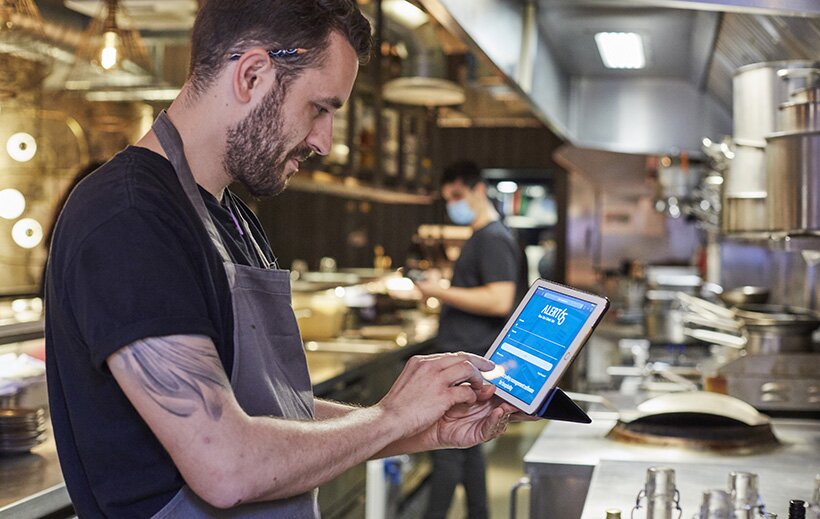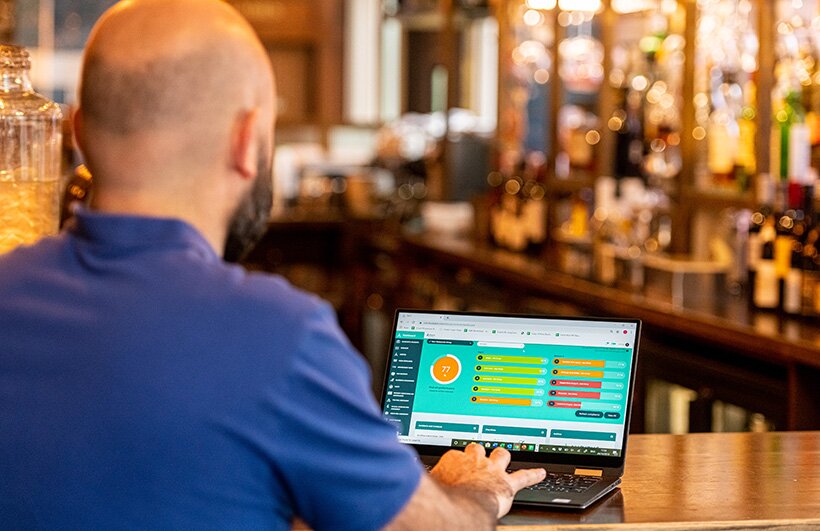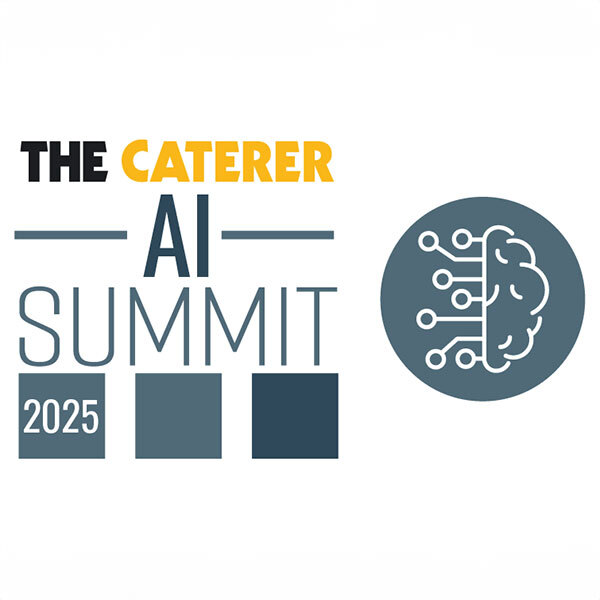Technology Prospectus 2021: setting up an allergy alert system
Covid safety has flown to the top of operators’ priority lists this year, but with new allergen laws coming into force in 2021, now isn’t the time to drop the ball on other food safety issues. Elly Earls looks at the solutions.
Since hospitality businesses started reopening, food safety consultants have – unsurprisingly – been bombarded with questions about how to keep their staff and customers safe from Covid-19.
Common concerns have been around social distancing in kitchens, the use of face coverings if social distancing isn’t possible, enhanced hand-washing, pod working to ensure staff members only work with the same people, implementing one-way systems and ensuring all staff complete health declarations before work. In addition, many businesses have started to offer takeaway or delivery services for the first time, which require additional safety considerations.
But while the food safety advice lines are busier than ever, the worry for experts is that the queries that would usually be coming in – around everything from allergens to cold storage – have dropped off. All of this is happening at a time when staff numbers are severely reduced, which in itself has the potential to affect food safety.
At health and safety consultancy Food Alert, 80% of calls are now Covid-related. As technical director Julia Wilson says: “Our biggest concern is that operators don’t lose focus on the most important food safety issues, as well as Covid. We’ve got to be Covid-safe, but food safety still matters.”
Staying on top of allergens
One issue operators must continue to keep at top of mind is allergens. In October 2021, Natasha’s Law will come into force, which means that any food classed as pre-packed for direct sale must be labelled like it would be in a supermarket, with allergens highlighted.
“Food businesses will be at risk if they cannot clearly prove that they provided clear allergen information, should they ever receive an allergen complaint,” explains Ben Gardner, chief executive at safety consultancy Navitas.
While paper records have long been accepted in food businesses, their limitations have become increasingly clear as regulations have become more stringent. They’re easy to falsify, and don’t provide the prompts, guidance or instant insight a digital system can. They also take up a lot of front-line staff, which is in shorter supply than ever during the pandemic.
“It’s simply no longer possible to truly stay on top of all your food safety using a paper-based system,” says Gardner. With a digital allergen management and tracking system, food businesses can always prove that they have clearly labelled any allergens in all the food they produce for direct sale because it maintains a record of every allergen label that has been printed.
The Navitas Digital Food Safety system, for example, keeps a record of the food that has been produced, who printed the label, which allergens were present within the food and when the label was printed. This can also be cross-referenced with the barcode and the point of sale system for complete traceability.
Many systems can also show an audit trail of compliance right from the supplier. Alert65, for example, has a supplier module, which automatically sends out letters to suppliers to get information from them about allergens, which can then be inputted into recipes and dishes within its allergen management module.
There’s also software on the market, such as StarChef, where you can simply type in the ingredients in each dish and the allergens are automatically pulled out.
“Having the ability to have all that information in one place, digitally, is brilliant – much better than having to rely on someone filling in a Food Standards Agency (FSA) form, which they don’t update properly and you can’t quite read their handwriting,” says Wilson. “That consistency is really helpful.”
However, she warns that it’s important not to rely 100% on technology. “As a manager you need to go over it and check that everything you’ve put in has been picked up and there aren’t any glaring errors. Although these pieces of software are great, there’s still the need for some human element to check everything is as it should be.”

Getting food-to-go right
Delivery, click and collect and takeaway became the lifeblood of many hospitality businesses during lockdown, and continue to be more important than they ever have been. One concern safety experts have is whether operators know what this means from an allergen standpoint – and have implemented the correct procedures.
As Mark Flanagan, chief executive of Shield Safety Group, explains: “The guest is now one step further away to communicate with and collecting and understanding their needs becomes more difficult. Careful consideration must be given as to how guests’ needs are identified, communicated in the kitchen and then how the food is prepared and delivered safely to the customer.”
The FSA has produced excellent guidance around this, as have many food safety companies. According to Gardner, some of the food safety measures that should be implemented, specifically related to allergens, include:
- If using online ordering services, allergy information must be available to customers at the point of selection. This can be verbally, by providing a phone number online; but it is essential that the information you provide is accurate for the dishes produced so customers are able to make informed choices when deciding on their meal.
- Label each container with the exact name of the dish – if it is handwritten, ensure the information is clear and legible. This is particularly important when dealing with allergy sufferers’ orders.
- Separate meat, vegetarian and allergy dishes within each order. Any allergy dishes should be placed on top, ideally double-wrapped, with the other containers underneath; or, even better, delivered completely separately.
- Accurate allergy information must be available at the point of delivery for ‘distance selling’, so encourage the delivery driver to ask the customer if they need any further information at the door before they wish them “bon appétit!”
Hot holding is another challenge for businesses that have branched out into off-premise ordering, according to David Davies, chief product officer at safety compliance firm Checkit. “Safety and compliance depend on food being stored, prepared and served at the correct temperature. Hot-hold food in particular can be kept at a specific temperature only for a specific period of time,” he says.
Systems like Checkit’s, which can track the provision of hot food-to-go automatically, mean staff don’t have to worry about recording temperatures manually – sensors do it for them. Managers also receive important data about how many food items are prepared, how many are purchased and how many are wasted throughout opening hours.
This not only gives operators a much stronger basis for safety and compliance, but enables the business to more accurately align supply and demand to prevent waste and increase efficiency.
Temperature monitoring
Similar technologies can be applied on-premise. “You can now take the temperature of all your goods using a probe that is automatically Bluetoothed into your food safety recording system,” says Wilson. “You don’t have to write the information down or even log into the system.”
Adds Gardner: “A digital probe already contains all your supplier information, so allows goods-in to be checked for compliant temperatures and automatically logged within one central system. Any issues can be flagged there and then, with unsafe food being declined and sent back.
“They also have clear proof, accessible anytime within the system, that the goods were delivered unfit for use to avoid any further issues or disputes.”
Automated temperature monitoring of fridges and freezers can also save time and worry for operators. “You get a timeline of the temperature 24-7 and you get to see those fluctuations,” explains Wilson. “You’ll also get an alarm if there’s an issue and you can sort out the issue much quicker.”
Digital insights
For Davies, one of the biggest issues with paper records is that there is no real-time visibility. “Paperwork gets filed away and problems may not come to light until it’s too late. The other problem is that potentially valuable insight from those records goes unseen,” he says.
By contrast, a digital approach, such as Checkit’s Connected Workflow Management, prompts, guides and logs best practice directly at the frontline. “It’s easy for staff to see and record tasks on a mobile device – and collaborate with colleagues to ensure everything is completed. The time savings alone can stretch to several hours a week,” Davies explains.
“The resulting flow of data is available to managers in real time and they can configure alerts to let them know when certain key tasks are overdue. The result is a robust digital audit trail, attributable to individuals, automatically time-stamped and tagged to a specific location. Managers can track activity against key performance criteria, benchmark and compare sites, and identify areas for improvement.”
A similar level of granularity can be achieved when it comes to stock management, according to Flanagan, with the latest electronic point of sale (EPoS) systems allowing insight into stock holding, yield and slow-moving items.
“For food safety, this can help identify those sites who are potentially holding too much stock, leading to out-of-date food,” he explains.
“The same systems can be used during menu changes to identify old and new stock units and manage the risk of allergens. However, a balance must be struck between managing the yield performance and food safety performance. If a business is heavily monitored on stock management and yield performance, it can lead to negative food safety or quality, such as reducing portion size or using out-of-date food.”
Next year will be a balancing act for operators. While Covid remains top of every operator’s mind, it’s crucial they don’t lose focus on other food safety issues.
“Before the pandemic, the focus was on allergens,” Flanagan says. “The risk has not gone away, but the focus probably has reduced. Ensuring the management of allergens throughout the business, from menu design, procurement, recipe creation, dish preparation and then service, has to be a priority.”
Wilson stresses that stock management is also more of a challenge than ever, with Covid regulations changing on a weekly basis. “There’s a lot of uncertainty about moving from Tier 1 to 2 or 3 and the impact in terms of having to throw food away. It’s crucial that operators know their market, know their stock and know which food is perishable,” she advises. “But it’s also about rationalising your menu so you can get lots of dishes from similar ingredients.”
As Gardner concludes, 2021 is the year to go digital, if you haven’t already. “Food businesses need to do more with less and faster. Consumers are going to be even more sensitive to food hygiene standards and will choose not to dine with you if they feel you’re not conforming to the highest levels of safety.”
Cloud-based compliance at Urban Leisure Group

Urban Leisure Group, which operates nine bars in the London area, has embraced the digital transformation of its safety compliance during the Covid-19 pandemic.
Faced with having to shut down its premises overnight and then prepare them for reopening with relatively short notice, operations manager Hannah Vernon was grateful to have access to Food Alert’s cloud-based compliance software, Alert65.
The application gives hospitality businesses the tools they need to tackle complex compliance issues by automating manual tasks and centrally storing information and policy documents across multiple locations.
Hannah says: “We were already users of Alert65 but the true value of the software has really shone during these challenging times. The Food Alert team were very quick to respond to the crisis and update the operational guidance and checklists in accordance with the new world that we faced.
“Being able to use Alert65 to access all the risk assessment task lists and templates from my home office for all our venues, was such a relief and made my job so much easier. It is also the essential ingredient that every operator needs to make sure that complex food safety management, especially at a time when we are evolving our offer with takeaway and click and collect to meet the new trading conditions, is made easy.
“We manage all our food safety requirements in one place, including allergen management, supplier management, cleaning schedules and HACCPs.
“Covid has demonstrated how digital and paperless compliance is no longer the future, but the here and now.”
Staying close to the supply chain

Paul Dickinson is director of food at Fuller’s. He says the pause that the Covid-19 lockdown provided was an opportunity for the business to up its game when it came to food safety procedures.
“We had the ability to stop our business, clean up our operations and understand where the opportunities were,” he says. “We wanted to focus on efficiency, performance and agility and digital seemed to have the answers. It’s something we never thought we’d get into so quickly and although it hasn’t been easy, it’s been positive.”
Fuller’s had always used Food Alert to validate its operations. “All the audits were unannounced. You should only be as good as your weakest moment,” Dickinson says. But now the business is rolling out an app-based tool to record HACCPs and allergens and moving away from paper.
“It’s been really helpful to have a weekly update of the due diligence and safety of our business rather than waiting until the end of an audit to get a paper report,” he says. “It’s really brought things together and having a digital interface has made it a lot more reassuring that if there’s a problem or if you have any concerns, you can manage it.
“Paper is dangerous because it’s not live. In Covid times and with Brexit coming, if you’re not close enough to the information in your supply chain, you could get caught out.”
Read the full Technology Prospectus 2021 here
Photos: Shutterstock



















